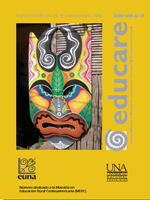La participación en el aula escolar rural: un reto para la transformación
DOI:
https://doi.org/10.15359/ree.12-Ext.14Keywords:
participation, rural community, rural schoolAbstract
This work analyses the participation as a way to exert the right to education, as a mean to democratize the learning process and as a channel to achieve pertinence in the educational process. It assumes that parents, students and other members of the community have to be near the school and the classroom not only to collaborate with the tasks traditionally assigned to them but also to develop a new way of participation that involves a construction process of the learning process. To achieve this purpose, the authors enunciate different strategies, useful to the get school and community together.
References
Arrien, J. B. (2003). La educación Rural en Centroamérica (Conferencia Inaugural). En M. E.
Aguilar y Cerdas (Comp.), La educación rural en Centroamérica. II Seminario centroamericano
de educación rural (pp. 1-23). Heredia: EUNA.
Durston, J. (1997). La participación comunitaria en la gestión de la escuela rural. En E. Cohen (Aut.),
Educación, eficiencia y equidad (pp. 68-84). Santiago, Chile: Ediciones SUR.
Freire, P. (1994). Participación y educación Comunitaria [Extracto de Ponencia]. En: M. Castells
(Aut.), Congreso Internacional de “Nuevas perspectivas críticas en educación” (pp. 1-5).
Paidós, Barcelona: División de Ciencias de la Educación. Extraído el 22 de agosto de 2007
de http://peuma.unblog.fr/files/2007/12/educacionyparticipacion.pdf
van der Bijl, B. (2003). Escuela rural y desarrollo comunitario (2a
ed.).Heredia, Costa Rica:
Universidad Nacional.
Downloads
Published
How to Cite
Issue
Section
License
1. In case the submitted paper is accepted for publication, the author(s) FREELY, COSTLESS, EXCLUSIVELY AND FOR AN INDEFINITE TERM transfer copyrights and patrimonial rights to Universidad Nacional (UNA, Costa Rica). For more details check the Originality Statement and Copyright Transfer Agreement
2. REUTILIZATION RIGHTS: UNA authorizes authors to use, for any purpose (among them selfarchiving or autoarchiving) and to publish in the Internet in any electronic site, the paper´'s final version, both approved and published (post print), as long as it is done with a non commercial purpose, does not generate derivates without previous consentment and recognizes both publisher's name and authorship.
3. The submission and possible publication of the paper in the Educare Electronic Journal is ruled by the Journal’s editorial policies, the institutional rules of Universidad Nacional and the laws of the Republic of Costa Rica. Additionally, any possible difference of opinion or future dispute shall be settled in accordance with the mechanisms of Alternative Dispute Resolution and the Costa Rican Jurisdiction.
4. In all cases, it is understood that the opinions issued are those of the authors and do not necessarily reflect the position and opinion of Educare, CIDE or Universidad Nacional, Costa Rica. It is also understood that, in the exercise of academic freedom, the authors have carried out a rogorous scientific-academic process of research, reflection and argumentation thar lays within the thematic scope of interest of the Journal.
5. The papers published by Educare Electronic Journal use a Creative Commons License:














 The articles published by Educare Electronic Journal can be shared with a Creative Commons License:
The articles published by Educare Electronic Journal can be shared with a Creative Commons License: 



